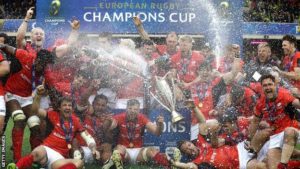 NEW YORK, NY – “Too much of sport operates under the tyranny of the result; the core principle at Saracens is that we gather talented people together, treat them unbelievably well and in return they try unbelievable hard. That is it. Everything else – winning or losing matches, winning or losing Cups – are just outcomes. They are not the primary aim.” Former Saracens CEO Edward Griffiths.
NEW YORK, NY – “Too much of sport operates under the tyranny of the result; the core principle at Saracens is that we gather talented people together, treat them unbelievably well and in return they try unbelievable hard. That is it. Everything else – winning or losing matches, winning or losing Cups – are just outcomes. They are not the primary aim.” Former Saracens CEO Edward Griffiths.
These are not the words one might expect from the man in charge of an elite team in the cutthroat world of professional sport, but since 2009 Saracens have established a reputation for doing things differently, raising no shortage of eyebrows along the way. The results have spoken for themselves; one Anglo-Welsh Cup, three regular season first place finishes in the English Premiership, five Premiership finals (winning three with a fourth still a possibility this season) and three European Cup finals (winning two). Saracens are currently the most dominant team in the northern hemisphere and seem to only be getting better. But this has certainly not always been the case; between 1998 and 2009 Saracens’ average league finish was 7th out of 11 teams, and in 2002, 2004 and 2006 they survived relegation by just one spot. In the same time period, they never progressed further than a semifinal in either European or domestic cup competition. They consistently splashed the cash to sign big names such as Francois Pienaar, Michael Lynagh, Philippe Sella, Tim Horan, Thomas Castaignede and Chris Jack, but still the trophies eluded them. Given their mediocrity on the pitch, Saracens started to garner a reputation as big-spending underachievers, whose gimmick-filled matchdays were looked down upon by the English rugby elite such as Leicester, Bath and Northampton. So what’s changed?
Under the stewardship of longstanding Chairman and benefactor and Nigel Wray, sweeping changes began with a seismic shock to the Saracens organisation ahead of the 2009-2010 season, as new South African head coach Brendan Venter axed 18 players in 48 hours in an episode which came to be known as “the night of the long knives”, while 7 of his new 13 signings hailed from South Africa. This, combined with the South African Johann Rupert having taken over majority ownership of the club in January 2009, prompted many onlookers to ridicule that it would be appropriate to rename the club “Saffacens“, while large swathes of the club’s fans were outraged that their team’s English identity was being discarded purely to attract the support London’s sizeable South African population who did not follow a Premiership team. Crucial to quelling these voices of protest was the resultant success on the pitch; Saracens won their first ten games of the season and, in spite of a midseason wobble, they found themselves in the Premiership final for the first time, losing narrowly to Leicester. The Saracens revolution had started; what’s followed has been a relentless march towards the top of both the domestic and European game, with the backbone of the team now undeniably English.
What fascinates me most about the success the club has experienced in recent years is that it has arguably been driven mostly by the off-field culture they have created. There is less emphasis now on big-name, big-money signings, rather the club looks to selectively add experienced internationals to complement the raft of young talent coming through from its academy. The club puts huge emphasis on every aspect of the “process” of creating the best possible environment for each player to excel. This is best described by the words of former CEO Edward Griffiths, who was instrumental in this mindset shift; “Our process, which is key, is looking after people. We just believe that you get more out of people by treating them well, by looking after them as opposed to scaring them. In a lot of professional sports the mantra is to “treat them mean to keep them keen.” We’re at the other end of the spectrum. We want them to feel unbelievably comfortable, unconditionally loved, and supported in everything they do.”
When Saracens players talk about playing for the club, they often focus on the strength of the relationships within the team and their drive to “make memories”. Another unconventional practice for which they have become famous are their team building trips which often take place at critical times in the season. This season, for example, mere hours after beating Munster in Dublin in the semifinal of the Champions Cup, the team took off for two days’ team bonding in Barcelona. That’s two days which were not spent focusing on physical recovery, training, video analysis or preparation for the final two rounds of the Premiership; an almost unthinkable situation in today’s world of strict professionalism. Other mid-season trips have included Oktoberfest, New York, Miami and Switzerland. Hooker Schalk Brits believes these getaways are far more than club-sponsored partying; “Sometimes people wonder how you get an extra five per cent out of a player; how can you get him up off the ground. If you feel so much love for the team and want to earn the respect of the guy next to you, all the shared experiences of the past help you do a lot more for each other.” This view is corroborated by legendary former flanker Jacques Burger; “We want to go out there and bleed for each other and do absolutely everything for each other. In order to do that, you have to spend time together and really become friends and become close. It is about memories. It is not just about playing rugby, it is about the whole experience”.

What’s more, Saracens are committed to helping players prepare for life after rugby; they employee three full time members of staff who are solely focused on developing a second career for each player. It is compulsory for all professional players at Saracens to be either studying at university for further education, or working one day a week gaining experience in a field they will work in full-time after rugby; club captain Brad Barritt graduated with his MBA in September 2016, while USA winger Chris Wyles has started his own craft brewing company. The club believes it is not only their responsibility to help prepare players for life after rugby, but it also makes good business sense; by proactively assisting players in addressing the daunting prospect of starting a second career, it means they are far more likely to stay at Saracens earning less than they might elsewhere because they can see the wider, long-term benefits on offer at the club. To quote Brits again “That’s what makes this club quite a special place. The rugby’s important but the individual comes first.” This culture has enabled Saracens to squeeze every drop of performance out of all their players; they are arguably the best team in the northern hemisphere, however their lineup is not full of household names, particularly in the backline. Of the XV which started the Champions Cup final, I would categorise only four as world class; Mako Vunipola, Maro Itoje, Billy Vunipola and Owen Farrell. The likes of Richard Wigglesworth, Brad Barritt, Jackson Wray and Alex Goode are key players for Saracens, but they would not be regarded as rugby superstars. They are an example of a team which is greater than the sum of its parts, and this must be credited to the environment the club has created to put every player in the best position possible to achieve excellence.
That’s all for now, please feel free to comment below, look for and “Like” our Facebook Rugby Wrap Up Page and follow us on Twitter@: @RugbyWrapUp, @MichaelHalsey24, @Matt_McCarthy00, @Junoir Blaber, @JWB_RWU, @Luke Bienstock, @Ronan Nelson, @MeetTheMatts, @Brian C Cole and @Declan Yeats.

